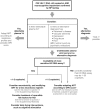Assessment, diagnosis, and treatment of HIV-associated neurocognitive disorder: a consensus report of the mind exchange program
- PMID: 23175555
- PMCID: PMC3657494
- DOI: 10.1093/cid/cis975
Assessment, diagnosis, and treatment of HIV-associated neurocognitive disorder: a consensus report of the mind exchange program
Abstract
Many practical clinical questions regarding the management of human immunodeficiency virus (HIV)-associated neurocognitive disorder (HAND) remain unanswered. We sought to identify and develop practical answers to key clinical questions in HAND management. Sixty-six specialists from 30 countries provided input into the program, which was overseen by a steering committee. Fourteen questions were rated as being of greatest clinical importance. Answers were drafted by an expert group based on a comprehensive literature review. Sixty-three experts convened to determine consensus and level of evidence for the answers. Consensus was reached on all answers. For instance, good practice suggests that all HIV patients should be screened for HAND early in disease using standardized tools. Follow-up frequency depends on whether HAND is already present or whether clinical data suggest risk for developing HAND. Worsening neurocognitive impairment may trigger consideration of antiretroviral modification when other causes have been excluded. The Mind Exchange program provides practical guidance in the diagnosis, monitoring, and treatment of HAND.
Figures


References
-
- Powderly WG. Sorting through confusing messages: the art of HAART. J Acquir Immune Defic Syndr. 2002;31(suppl 1):S24–5. - PubMed
-
- Albert SM, Weber C, Todak G. An observed performance test of medication management ability in HIV: relation to neuropsychological status and adherence outcomes. AIDS Behav. 1999;3:121–8.
-
- Berger JR, Brew B. An international screening tool for HIV dementia. AIDS. 2005;19:2165–6. - PubMed
-
- Farinpour R, Miller EN, Satz P, et al. Psychosocial risk factors of HIV morbidity and mortality: findings from the Multicenter AIDS Cohort Study (MACS) J Clin Exp Neuropsychol. 2003;25:654–70. - PubMed
Publication types
MeSH terms
Substances
Grants and funding
LinkOut - more resources
Full Text Sources
Medical

